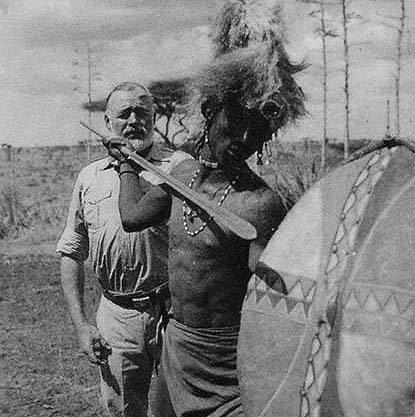Ernest Hemingway. For Whom the Bell Scolds. Two men. Two souls; the image and the shadow circling each other. He mostly lived up to that dazzling public persona he constructed for himself, but what deeper forces, psychic jackals, stalked his later years…
In Jung’s catalogue of types, Ernest Hemingway as a public figure- though not in private- was clearly an extroverted man of sensation. Would Jung have said that he was tired of his persona; that it had ceased to mobilize his psychic energy; that the persona had begun to weaken the subjective force of his writing by substituting itself for his proper heroes- as it did in his long sea novel, Islands in the Stream? Would Jung have advised him to cultivate some repressed side of his personality, for example, the side on which he was clearly an introverted intellectual? One has a brief vision of Hemingway retiring into solitude to write a handbook of fiction or an Apologia Pro Vita Sua. it is a fascinating picture, but hardly one for which Hemingway would have been willing to sit as a model.

—Author Ernest Hemingway poses writes at a portable table while on a big game hunt in September 1952 in Kenya. (Photo by Earl Theisen/Getty Images)—Read More:http://blog.gettyimages.com/2012/08/21/earl-theisen-my-dad-daughter-finds-negatives-of-marilyn-more/#.UGcFj1Fb76M
After the disaster of the plane crashes in East Africa, it was too late for simple therapeutic measures. It was even too late for a return to the Catholic church, a step that Jung might have advised him to take as a means of surmounting his inner problems. Hemingway had lived too hard, and it would seem that he was older physiologically than by the calendar. He had suffered too many internal injuries, he had been battered on the head as often as a punch-drunk fighter, and he no longer had enough resilience to go back to an old faith or adopt a new style of life or undertake a new approach to writing.

The Hemingway lifestyle was a model for many, including L.Ron Hubbard the founder of Scientology:—Hubbard was no stranger to strong drink and boasted that he could drink anyone under the table and often did. Ron was that rare drunk who could drink a fifth of scotch and still appear to be clearheaded and write adventure stories. He fancied himself to be Hemingwayesque in this regard, this although his pulp fiction was not even remotely close to the work of the Old Man, the great Hemingway.
Ron was very upset about what had happened with his command because he wanted to be like Ernest Hemingway. He saw himself after WWII in a bar in Cuba drinking and trading stories with the Old Man himself. That was his fantasy: To run with Hemingway in Pamploma and to smoke cigars and drink with Ernest in Africa during a big game hunt, and, like Ernest, to be lionized by the world’s press as a man’s man and a Nobel Prize writer…..Read More:http://ocmb.xenu.net/ocmb/viewtopic.php?t=14636&start=15
Besides all that, Hemingway was committed to his public image. He was also tired of it, acting out the pretense of the bon-vivant man’s man and archetype of American style masculinity. Perhaps. Perhaps is was too scary to shed the old skin. Nonetheless, this public image still had immense rewards to offer him, a niche that he had literally branded on his own and to which his literary rivals such as Dos Passos, Hart Crane, Cummins, Faulkner et al. could not imitate in its peculiar form of “Americana” ; and the mass adulation tends to be addictive….( to be continued) ….





 COMMENTS
COMMENTS